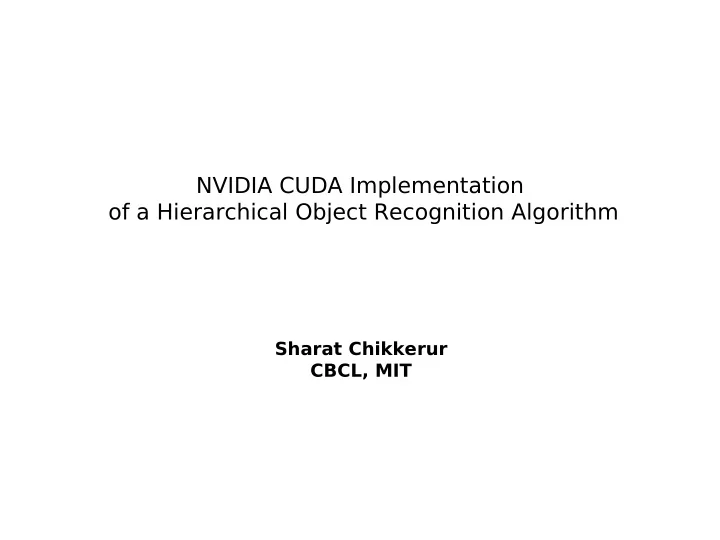

http://www.cubs.buffalo.edu NVIDIA CUDA Implementation of a Hierarchical Object Recognition Algorithm Sharat Chikkerur CBCL, MIT
Outline http://www.cubs.buffalo.edu Introduction Motivation Computational model of the ventral stream Multi threaded implementation CUDA Implementation Comparison Conclusion
modified from (Ungerleider and Haxby, 1994) http://www.cubs.buffalo.edu V4 V1 IT (Hubel & Wiesel, 1959) Desimone, 1991 (Desimone, 1984) (Kobatake and Tanaka, 1994) (From Serre et al.)
http://www.cubs.buffalo.edu (From Serre et al.)
Specificity and Invariance http://www.cubs.buffalo.edu 17 spatial frequencies (=scales) 4 orientations MAX C1 S1
Classifier http://www.cubs.buffalo.edu C2b Global Max (V4/PIT) S2b (V4/PIT) C1 Local Max (V1/V2) S1 (V1)
Baseline performance rear-car airplane frontal face motorbike leaf http://www.cubs.buffalo.edu [1] B. Heisele, T. Serre, M. Pontil, T. Vetter, and T. Poggio. Categorization by learning and combining object parts. In Advances in Neural Information Processing Systems , volume 14,2002. [2] B. Leung. Component-based car detection in street scene images. Master’s thesis, EECS, MIT, 2004. [3] M. Weber,W.Welling, and P. Perona. Unsupervised learning of models of recognition. In Proc. of the European Conference on Computer Vision , volume 2, pages 1001–108, 2000. [4] R. Fergus, P. Perona, and A. Zisserman. Object class recognition by unsupervised scaleinvariant learning. In Proc. IEEE Conf. on Computer Vision and Pattern Recognition , volume 2,pages 264–271, 2003.
Baseline timing http://www.cubs.buffalo.edu Basline Timing Performance 250 S1 C1 200 C2 Execution Time Total time 150 100 50 0 100 128 256 512 640 Image Size S1 C1 C2 Total time 100 1.090 0.320 7.659 9.069 128 1.809 0.459 11.217 13.485 256 7.406 1.422 38.315 47.143 512 31.276 5.648 153.005 189.929 640 37.840 6.580 180.282 224.702 Tests conducted using ‘matlab’ code over a 3GHz machine
Outline http://www.cubs.buffalo.edu Introduction Motivation Computational model of the ventral stream Multi threaded implementation CUDA Implementation Comparison Conclusion
Computational Complexity http://www.cubs.buffalo.edu S1 Performs normalized cross correlation between a bank of 64 filters (4 directions X 16 scales). Comptutational cost O(N 2 M 2 ) NxN – image size, MxM – filter size C1 Performs spatial and across scale max pooling Computational cost O(N 2 M) S2b Each S2b unit detects the presence of prototypical C1 patches learnt during training. Computational cost O(PN 2 M 2 ) P – number of patches (~2000) C2b Performs max pooling over all scales and all locations Computational cost O(N 2 MP)
Multi-threaded implementation http://www.cubs.buffalo.edu The HMAX(CBCL) algorithm consists of a series of split/merge steps The response to each patch(filter) can be computed in parallel B1 P1 F1 B2 P2 F2 B3 P3 F3 B4 P4 F4 S1 C1 S2
http://www.cubs.buffalo.edu
http://www.cubs.buffalo.edu
http://www.cubs.buffalo.edu
Outline http://www.cubs.buffalo.edu Introduction Motivation Computational model of the ventral stream Multi threaded implementation CUDA Implementation Comparison Conclusion
GPU architecture http://www.cubs.buffalo.edu CPU: Existing CPUs contain ~10 cores with larger shared memory Memory hierarchy is transparent to the program GPU: The GPU consists of ~100 cores with small shared memory Memory hierarchy is exposed and has to be exploited
Fine grained memory access http://www.cubs.buffalo.edu Registers: Thread R/W Shared : Block R/W Global : Grid R/W Constant : Grid R Texture : Grid R
Execution model http://www.cubs.buffalo.edu CPU (MT) Code to be executed has to be put in a function Function executed on a per thread basis ~10 threads GPU: Code to be executed on the GPU has to be put in a kernel SIMD type execution Kernel is invoked per thread basis in no specified order BlockIdx, threadIdx provide thread and block identity ~500 threads
Implementation strategy Decomposition http://www.cubs.buffalo.edu Each filter assigned to a block Each row assigned to a thread Strategy Transfer input to gpu texture memory Allocate output on gpu global memory Assign each filter to a block to a distinct block Divide the rows among the blocks Each thread writes directly to the output
http://www.cubs.buffalo.edu
http://www.cubs.buffalo.edu
Lessons learned http://www.cubs.buffalo.edu New programming strategy Kernel loading Order of execution not guaranteed Communication overhead is large Respect memory hierarchy Read forums when documentation is sparse!
http://www.cubs.buffalo.edu Thank you for your attention!
http://www.cubs.buffalo.edu C1 CUDA CPU (MT) MATLAB 64 0.03 0.05 0.41 128 0.07 0.46 0.79 256 0.16 1.13 2.53 512 0.46 5.14 10.39 C2 CUDA CPU (MT) MATLAB 64 0.17 0.53 2.41 128 0.33 1.31 4.57 256 0.72 7.91 12.18 512 1.81 17.91 45.56
Recommend
More recommend